Talk, tears but not much progress Painful reality, police killings come to mind with anniversary of George Floyd’s death
By The Final Call- May 25, 2021
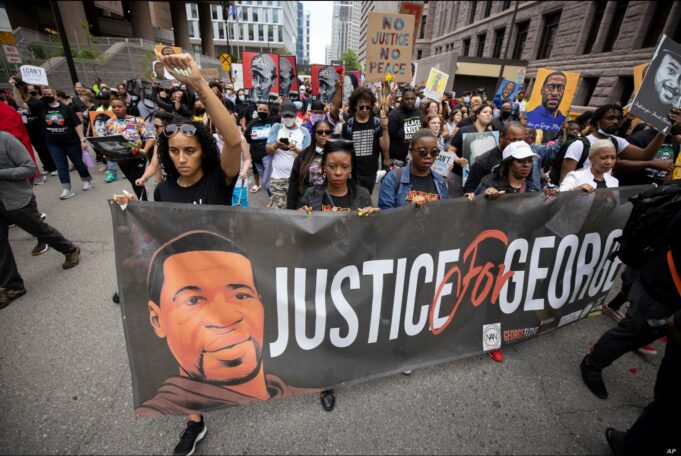
Capture AP George Floyd anniversary
by Barrington M. Salmon and Naba’a Muhammad
The Final Call @TheFinalCall
As the first anniversary of George Floyd’s murder approached, Blacks and others reflected demands made since May 25, 2020, the day the 46-year-old Black man was murdered by a White cop as onlookers screamed for him to stop kneeling on a dying man’s neck—and even videotaped his crime.
What has happened after calls for change from millions who took to the streets night and day for months after Mr. Floyd’s untimely death? they asked.
Most troubling, activists and advocates say, is in the midst of unprecedented social unrest and sustained pressure on law enforcement, the number of Blacks killed and injured by cops across the United States has continued unabated.
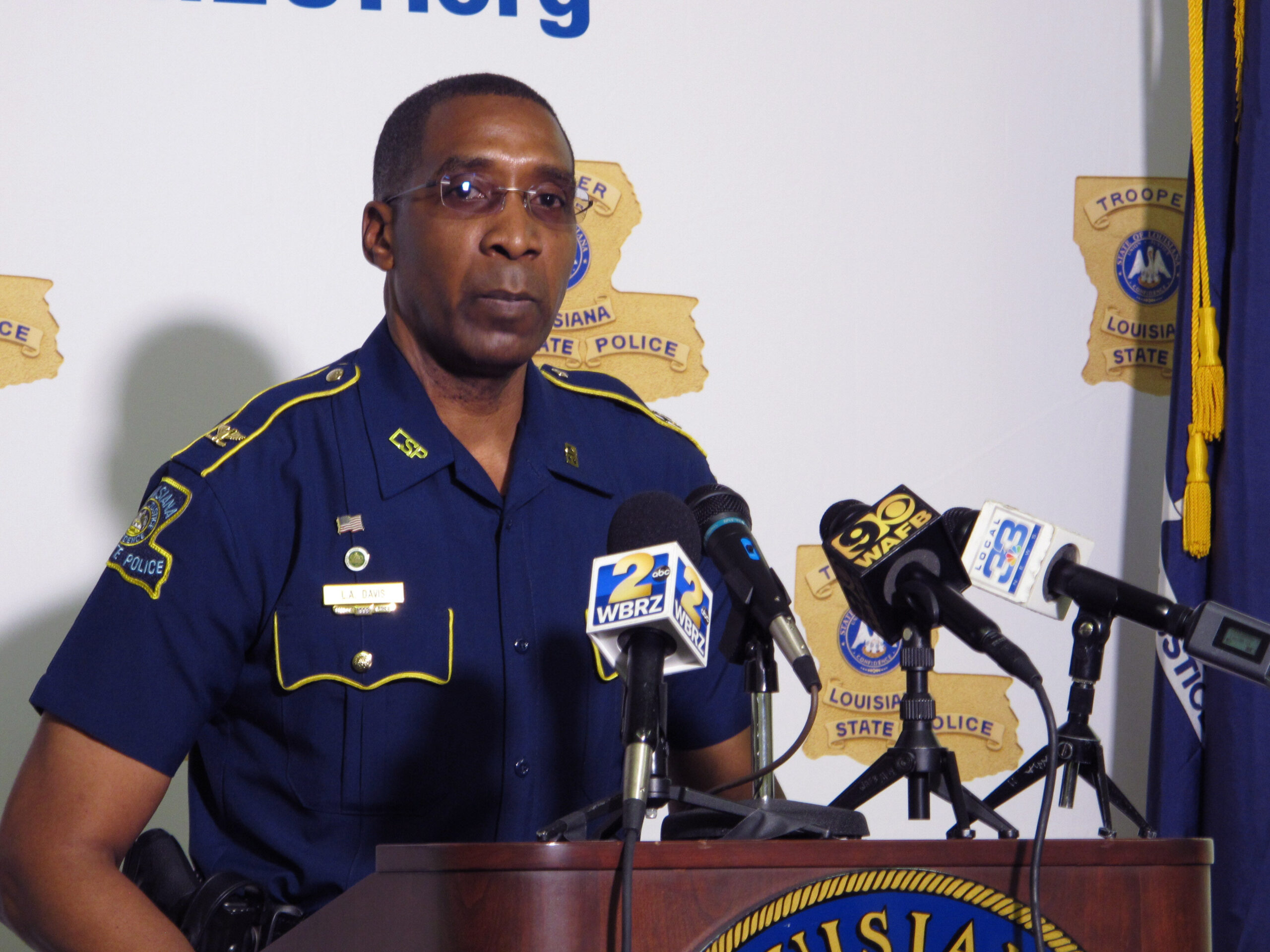
by Barrington M. Salmon and Naba’a Muhammad
The Final Call @TheFinalCall
As the first anniversary of George Floyd’s murder approached, Blacks and others reflected demands made since May 25, 2020, the day the 46-year-old Black man was murdered by a White cop as onlookers screamed for him to stop kneeling on a dying man’s neck—and even videotaped his crime.
What has happened after calls for change from millions who took to the streets night and day for months after Mr. Floyd’s untimely death? they asked.
Most troubling, activists and advocates say, is in the midst of unprecedented social unrest and sustained pressure on law enforcement, the number of Blacks killed and injured by cops across the United States has continued unabated.

Col. Lamar Davis, superintendent of the Louisiana State Police, speaks about the agency’s release of video involving the death of Ronald Greene, at a press conference held Friday, May 21, 2021, in Baton Rouge, La. Greene was jolted with stun guns, put in a chokehold and beaten by troopers, and his death is now the subject of a federal civil rights investigation. (AP Photo/Melinda Deslatte)
Police killings have not slowed and “at least 64 people have died at the hands of police since Derek Chauvin’s trial began. More than half were people of color,” reported BusinessInsider.com.
Mr. Chauvin, who was seen in widely viewed bystander video pressing his knee into Floyd’s neck as the Black man said he couldn’t breathe, was convicted in April of second-degree unintentional murder, third-degree murder and manslaughter. He’s to be sentenced June 25.
The article referred to findings by the New York Times that included cops killing “an average of 3 people a day since the trial started on March 29.”
And, it added, more than half of those killed were non-White.
The fatal killings included the police shooting of unarmed 13-year-old Adam Toledo in a Chicago alley, Michael Hughes, 32, was fatally shot by police at a Quality Inn in Jacksonville, Florida, a 40-year-old mentally ill man in Claremont, New Hampshire, was shot multiple times and killed after an exchange of gunfire with state police, and in Brooklyn Center, Minnesota, a White female cop fatally shot unarmed Daunte Wright, during a traffic stop. He died 10 minutes from where officer Chauvin was on trial. Some Blacks asked if the shootings were in retaliation for the trial and conviction of Mr. Chauvin?
Of the 64 incidents reviewed by The Times, at least 42 involved people accused of having firearms, more than 12 involved people who were mentally ill, and several involved domestic violence, the article said.
“Additionally, almost all the victims were men, the vast majority Black or Latino. The majority were also young; many of whom under the age of 30 include four who were just teenagers,” Business Insider reported.
Although Blacks account for about 13 percent of the U.S. population, they are killed by police at more than twice the rate of White Americans.
‘Nothing has changed’
Police killings have not slowed and “at least 64 people have died at the hands of police since Derek Chauvin’s trial began. More than half were people of color,” reported BusinessInsider.com.
Mr. Chauvin, who was seen in widely viewed bystander video pressing his knee into Floyd’s neck as the Black man said he couldn’t breathe, was convicted in April of second-degree unintentional murder, third-degree murder and manslaughter. He’s to be sentenced June 25.
The article referred to findings by the New York Times that included cops killing “an average of 3 people a day since the trial started on March 29.”
And, it added, more than half of those killed were non-White.
The fatal killings included the police shooting of unarmed 13-year-old Adam Toledo in a Chicago alley, Michael Hughes, 32, was fatally shot by police at a Quality Inn in Jacksonville, Florida, a 40-year-old mentally ill man in Claremont, New Hampshire, was shot multiple times and killed after an exchange of gunfire with state police, and in Brooklyn Center, Minnesota, a White female cop fatally shot unarmed Daunte Wright, during a traffic stop. He died 10 minutes from where officer Chauvin was on trial. Some Blacks asked if the shootings were in retaliation for the trial and conviction of Mr. Chauvin?
Of the 64 incidents reviewed by The Times, at least 42 involved people accused of having firearms, more than 12 involved people who were mentally ill, and several involved domestic violence, the article said.
“Additionally, almost all the victims were men, the vast majority Black or Latino. The majority were also young; many of whom under the age of 30 include four who were just teenagers,” Business Insider reported.
Although Blacks account for about 13 percent of the U.S. population, they are killed by police at more than twice the rate of White Americans.
‘Nothing has changed’
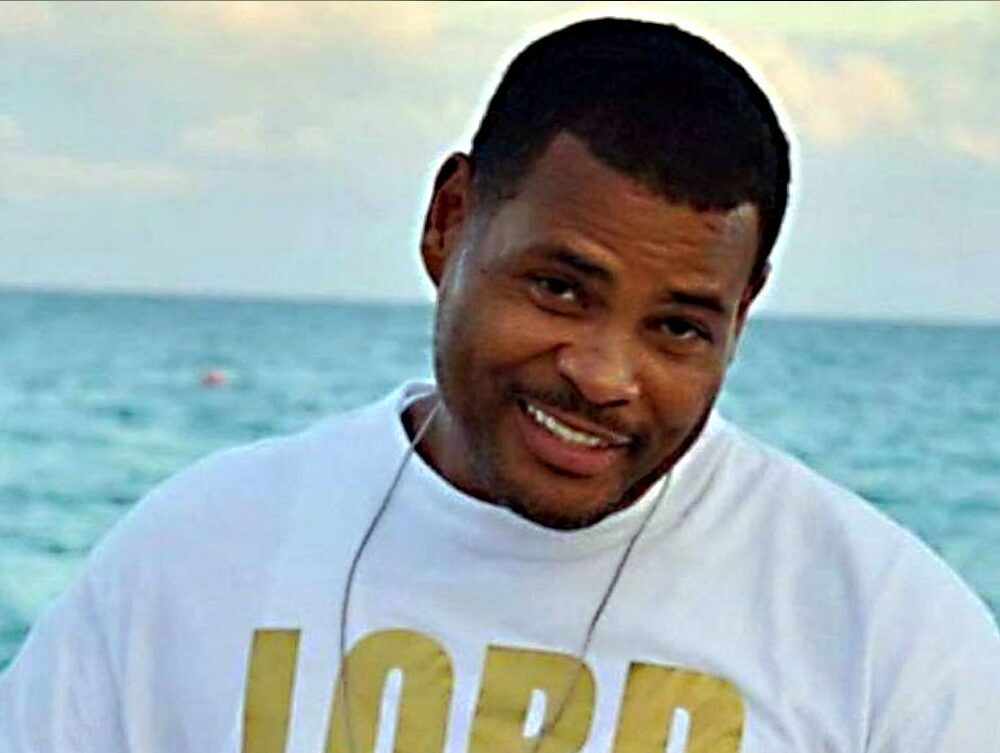
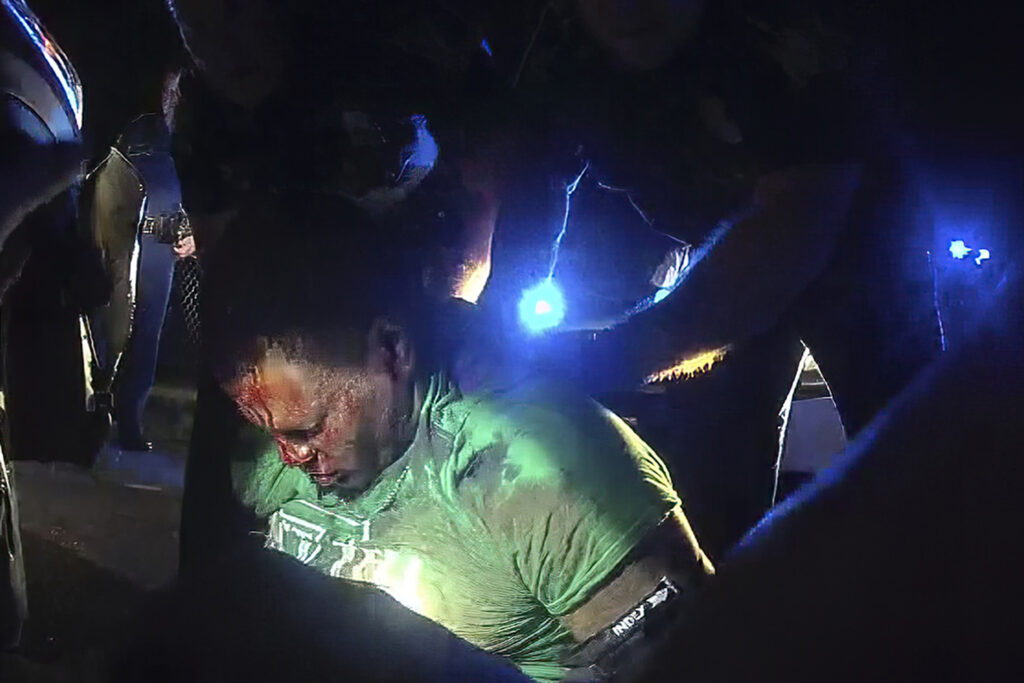
This image from video from Louisiana state police state trooper Dakota DeMoss’ body-worn camera, shows troopers holding up Ronald Greene before paramedics arrived on May 10, 2019, outside of Monroe, La. The video obtained by The Associated Press shows Louisiana state troopers stunning, punching and dragging the Black man as he apologizes for leading them on a high-speed chase, footage authorities refused to release in the two years since Greene died in police custody. (Louisiana State Police via AP)
As she surveys the national landscape, Cheryl Dorsey sees little evidence of the racial reckoning once widely spoken of.
“I don’t think we’re seeing a criminal justice reckoning. What we’ve seen weekly is that nothing has changed,” she told The Final Call, referring to the recent police killings of Ma’Khia Bryant, 16; Michael Leon Hughes, 32, Iremamber Sykap, 16; and Anthony Thompson Jr., 17, killed by a school resource officer in a high school bathroom after reports that a student had brought a gun onto campus.
Ms. Dorsey, a retired sergeant with the Los Angeles Police Department, is a vocal critic of police misconduct and police violence.
The recent release of video showing the end of a high-speed chase near Monroe, Louisiana in 2019 and the resulting death of Ronald Greene after he was beaten, tased and dragged by Louisiana State Police illustrates the dangers Blacks face from law enforcement daily, she said.
“The officers who kill people will be covered by qualified immunity and the officers’ bosses will lie,” said Ms. Dorsey, a Los Angeles native, commentator and author of “Black and Blue: The Creation of A Social Advocate Vol II.” And in a recent Twitter post, she explained that state police brutally chastised Mr. Greene because he fled: “Cops often ‘put hands on’ someone who flees. #RonaldGreene was punished; and then the cop took a victory lap when he bragged about beating the m-fer.”
Louisiana law enforcement officials stonewalled Mr. Greene’s family for two years, lied in a statement about how he died and refused to release body cam footage. But the Associated Press got ahold of arrest video, released it May 19 and released a second, more detailed video on May 21, which led Louisiana State Police to release the full video the same day.
Lee Merritt, an attorney for the Greene family during a May 21 interview on MSNBC, said the superintendent of the Louisiana State Police is dealing with a department “rife with corruption and brutality.”
State Police Superintendent Lamar Davis, who is Black, held a news conference to release what he called all video available at the time of Mr. Greene’s death.
“We cannot comment on the any of the conduct of the troopers related to the incident because the evidence of the conduct is under criminal investigation by other state and federal authorities,” Supt. Davis said, according to the Monroe (La.) News-Star.
As she surveys the national landscape, Cheryl Dorsey sees little evidence of the racial reckoning once widely spoken of.
“I don’t think we’re seeing a criminal justice reckoning. What we’ve seen weekly is that nothing has changed,” she told The Final Call, referring to the recent police killings of Ma’Khia Bryant, 16; Michael Leon Hughes, 32, Iremamber Sykap, 16; and Anthony Thompson Jr., 17, killed by a school resource officer in a high school bathroom after reports that a student had brought a gun onto campus.
Ms. Dorsey, a retired sergeant with the Los Angeles Police Department, is a vocal critic of police misconduct and police violence.
The recent release of video showing the end of a high-speed chase near Monroe, Louisiana in 2019 and the resulting death of Ronald Greene after he was beaten, tased and dragged by Louisiana State Police illustrates the dangers Blacks face from law enforcement daily, she said.
“The officers who kill people will be covered by qualified immunity and the officers’ bosses will lie,” said Ms. Dorsey, a Los Angeles native, commentator and author of “Black and Blue: The Creation of A Social Advocate Vol II.” And in a recent Twitter post, she explained that state police brutally chastised Mr. Greene because he fled: “Cops often ‘put hands on’ someone who flees. #RonaldGreene was punished; and then the cop took a victory lap when he bragged about beating the m-fer.”
Louisiana law enforcement officials stonewalled Mr. Greene’s family for two years, lied in a statement about how he died and refused to release body cam footage. But the Associated Press got ahold of arrest video, released it May 19 and released a second, more detailed video on May 21, which led Louisiana State Police to release the full video the same day.
Lee Merritt, an attorney for the Greene family during a May 21 interview on MSNBC, said the superintendent of the Louisiana State Police is dealing with a department “rife with corruption and brutality.”
State Police Superintendent Lamar Davis, who is Black, held a news conference to release what he called all video available at the time of Mr. Greene’s death.
“We cannot comment on the any of the conduct of the troopers related to the incident because the evidence of the conduct is under criminal investigation by other state and federal authorities,” Supt. Davis said, according to the Monroe (La.) News-Star.
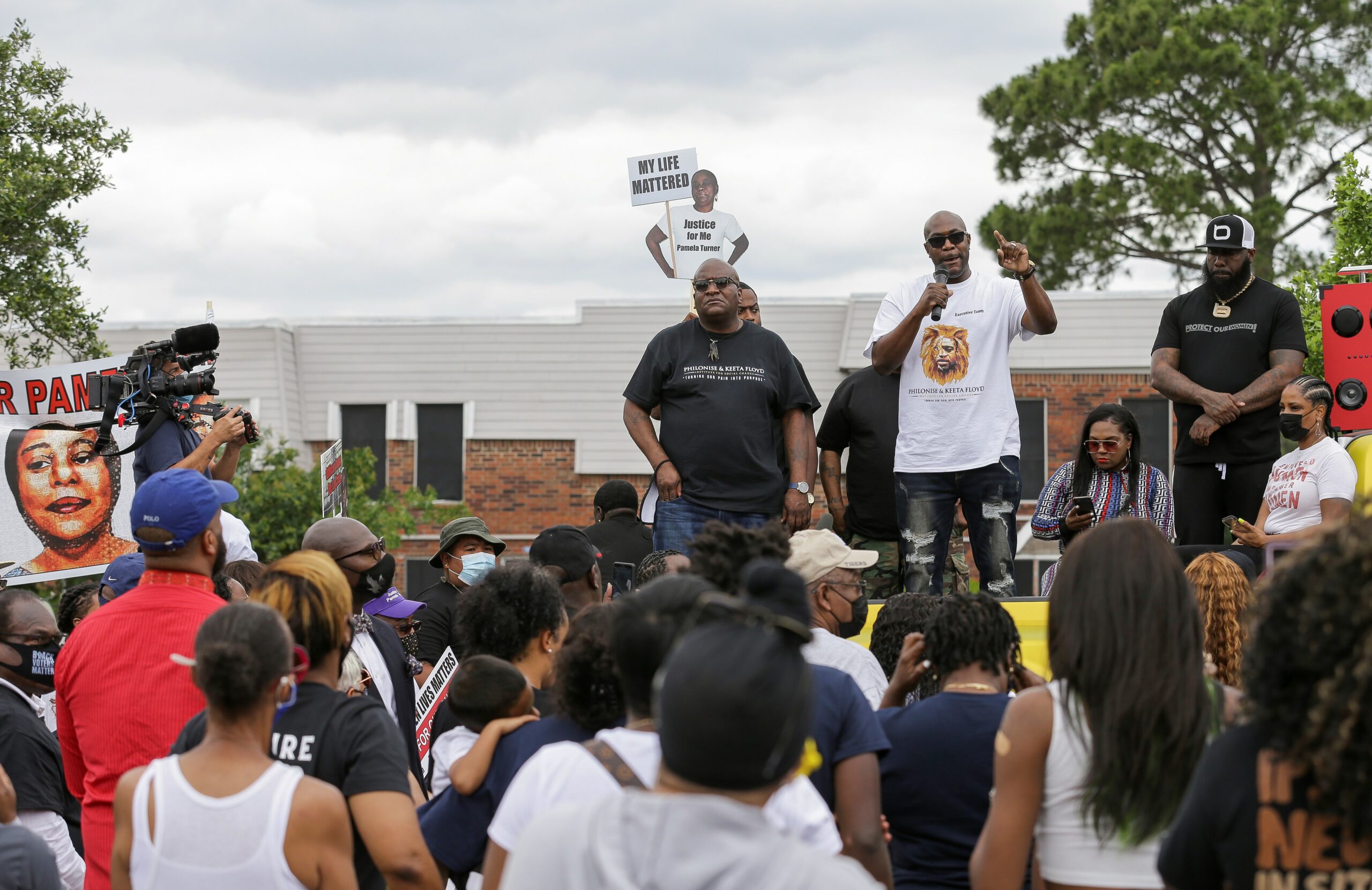
Philonise Floyd, the brother of George Floyd, talks to a crowd of supporters during a “Justice for Pamela Turner” rally on the two-year-anniversary of Turner’s death, Thursday, May 13, 2021, in Baytown, Texas. Turner was fatally shot in 2019 by a police officer in the Houston suburb after a struggle over his stun gun. (Godofredo A. Vásquez/Houston Chronicle via AP)
“Nor can I provide specifics of the investigation for the same reason,” he said. He did promise reforms had been made in how state police are to handle such encounters.
Mr. Merritt said he had long been asking police officials for files in the case. State police had told the family the bloody and bruised Black man died from a car crash.
“There must be criminal accountability for several acts and there must be an entire revamp of that unit,” said Mr. Merritt. “Ronald Greene was pepper-sprayed while on the ground. What you’re seeing is gratuitous violence. They were stomping on him, spraying him—actions any reasonable person would know could likely lead to his death and certainly be far in excess of anything necessary for a man who completely surrendered and was in handcuffs.”
There is a federal and state investigation underway, the attorney continued. He wants officers involved in Mr. Greene’s death to face administrative and criminal consequences for violations of the Constitution and the Louisiana state code.
“We can’t just move on from here and say this was bad and someone passed away,” Mr. Merritt said.
Ashley Shelton is the founder, president and CEO of The Power Coalition for Equity and Justice, a Louisiana-based coalition that works to build power and lift the voices of traditionally disenfranchised communities.
“Nor can I provide specifics of the investigation for the same reason,” he said. He did promise reforms had been made in how state police are to handle such encounters.
Mr. Merritt said he had long been asking police officials for files in the case. State police had told the family the bloody and bruised Black man died from a car crash.
“There must be criminal accountability for several acts and there must be an entire revamp of that unit,” said Mr. Merritt. “Ronald Greene was pepper-sprayed while on the ground. What you’re seeing is gratuitous violence. They were stomping on him, spraying him—actions any reasonable person would know could likely lead to his death and certainly be far in excess of anything necessary for a man who completely surrendered and was in handcuffs.”
There is a federal and state investigation underway, the attorney continued. He wants officers involved in Mr. Greene’s death to face administrative and criminal consequences for violations of the Constitution and the Louisiana state code.
“We can’t just move on from here and say this was bad and someone passed away,” Mr. Merritt said.
Ashley Shelton is the founder, president and CEO of The Power Coalition for Equity and Justice, a Louisiana-based coalition that works to build power and lift the voices of traditionally disenfranchised communities.
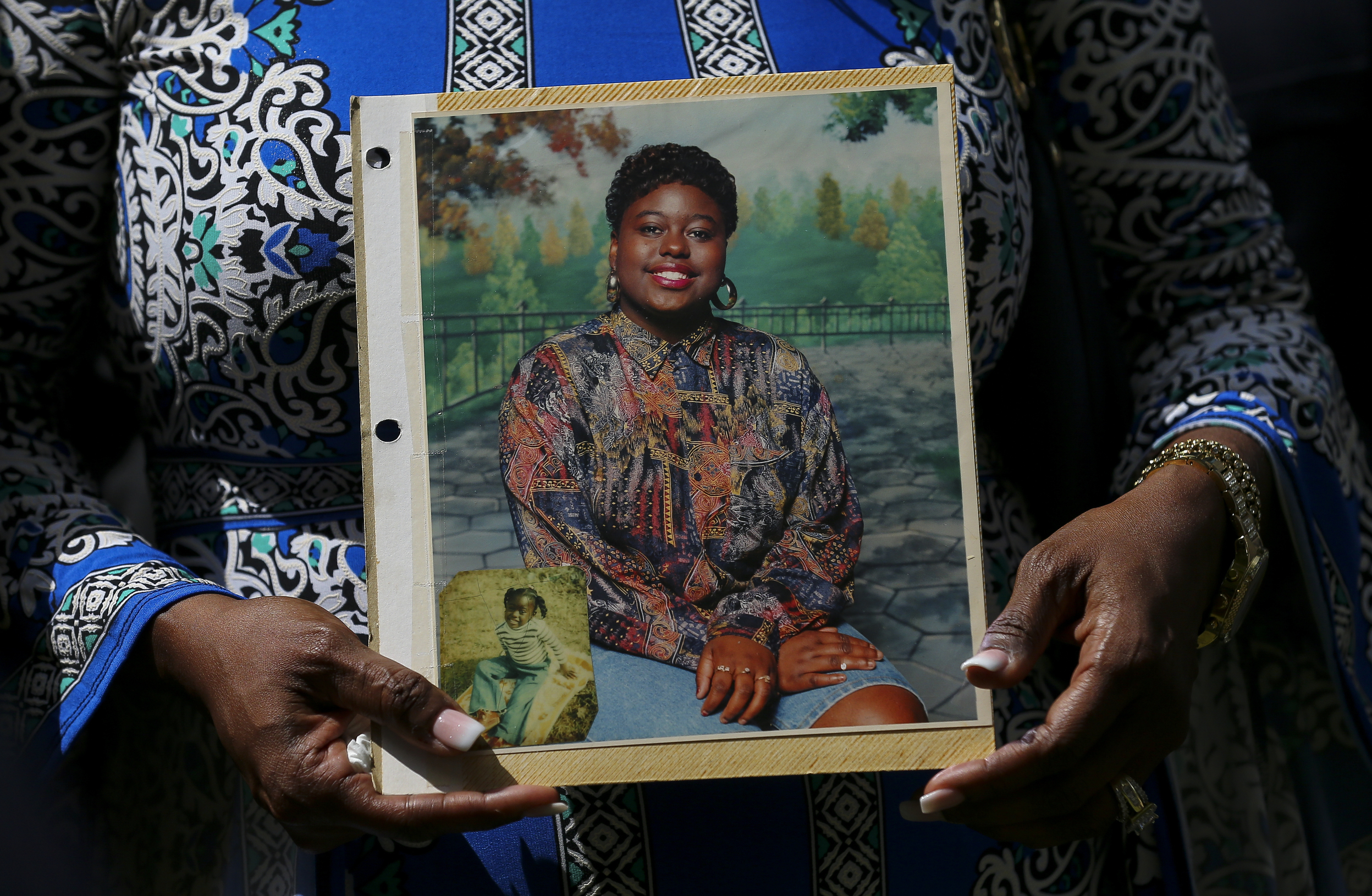
Antoinette Dorsey-James holds a picture of her sister Pamela Turner during a news conference outside the Harris County Civil Court in Houston on Thursday, May 16, 2019. Turner was killed during an altercation with a Baytown Police Department officer Monday night at The Brixton Apartments complex she lived at in Baytown, Texas. (Godofredo A Vasquez/Houston Chronicle via AP)
“This is an extremely painful time. People have seen and heard the video and are outraged,” she said. “This isn’t the first time. There was a killing in Shreveport. There’s just a lot of work that has to be done. I did not watch it but I listened to the video. I do not have the emotional capacity to see another Black man die.”
Floyd prosecutions aren’t over
Meanwhile federal legislation that was supposed to help rein cops in is stalled and didn’t meet the president’s goal of having the bill named after Mr. Floyd signed into law by the anniversary of his death.
The conviction of Mr. Chauvin, who is awaiting sentencing, may also be appealed. Talk has emerged of a possible mistrial because a Black juror attended a march marking the anniversary of the 1963 March on Washington last summer. One theme among march speakers was “Get Your Knee Off Our Necks.”
The trial of three former Minneapolis police officers charged with aiding and abetting in the death of George Floyd was pushed back to March 2022, after a judge’s ruling. Thomas Lane, J. Kueng and Tou Thao were scheduled to face trial Aug. 23 on charges they aided and abetted both murder and manslaughter.
All four officers face federal charges that allege they violated Mr. Floyd’s civil rights during his arrest last year.
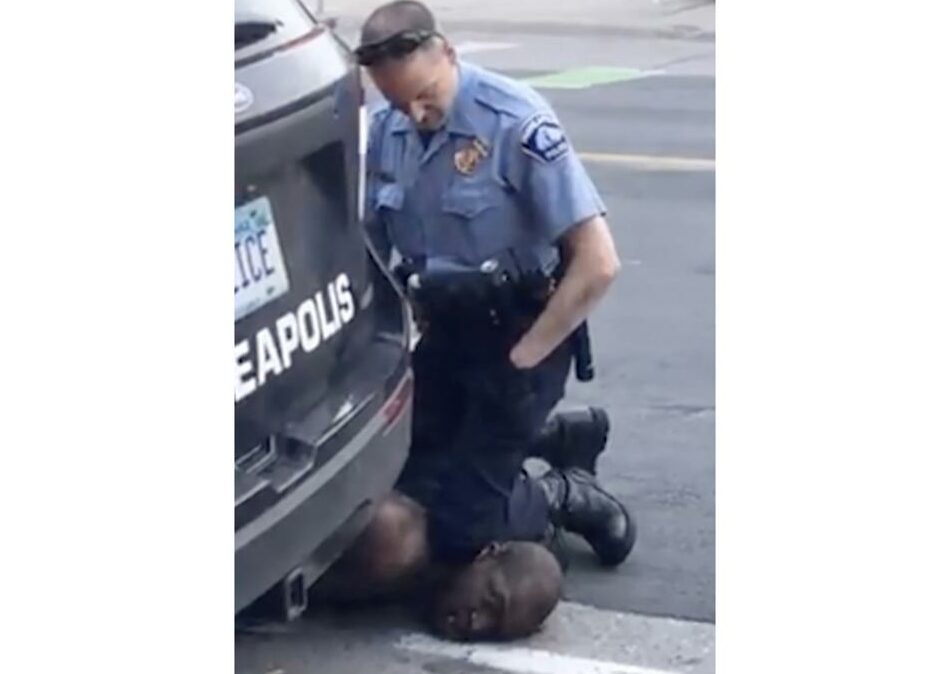
Judge Peter Cahill said he changed the date so the federal case can go forward first. He also said he felt the need to put some distance between the three officers’ trial and Mr. Chauvin’s due to all the publicity around the case.
Harry “Spike” Moss, who has lived in Minneapolis since age three, said the George Floyd verdict is only one case.
“Systematic racism is in every city and state in America,” he said. “Racism is woven into every fiber of the United States. Lawyers, judges, doctors, dentists, everyone. You can’t snap your fingers and change people. Trump got 70 million people to vote for him. Those are the same people who attacked the capital supporting Trump who is the second coming of Hitler.”
“Every part of the U.S. is White racism. It starts at a very young age. Racism is alive and well,” he said. The longtime activist and youth organizer added, “This is a very racist country and people of color need to stand together.”
“Power concedes nothing without a struggle. The key is to fall in love with each other, respect each other and not be afraid to call your African American and holla ‘Black Power!’ We’re not willing to be One. Don’t be an easy target to be scattered. We need to be a fist. We’ve never needed civil rights. We needed human rights,” he added.
Convictions like Mr. Chauvin’s remain extraordinarily rare. Out of the thousands of deadly police shootings in the U.S. since 2005, about 140 officers have been charged with murder or manslaughter and just seven were convicted of murder, according to data maintained by Phil Stinson, a criminologist at Bowling Green State University.
Criteria established by a landmark 1989 Supreme Court ruling on the use of force by police has afforded officer wide protections along with prosecutors reluctant to try cops and juries hesitant to convict.
Instead of just prosecuting officers after shootings happen, more must be done to prevent such encounters from happening in the first place, said Eugene Collins, who was a local organizer for the NAACP’s Baton Rouge, Louisiana, branch when Alton Sterling, a Black man selling CDs in front of a convenience store, was shot and killed by a White police officer in July 2016. The two officers involved in the encounter weren’t charged in his death.
Activists agree the fight for police reform and a more just legal system is far from over.
Criminal defense attorney Stan Germán described watching the Greene murder and viewing autopsy pictures as “sickening but not surprising.”
“Lynching in modern day America takes place at the hands of officers with a gun and a badge,” said Mr. Germán, executive director of the New York County Defender Services. “It’s been going on for generations but only now is America able to witness the murders on their screens. How many others are there? The FBI should open up an investigation into the death of every person who has died as a result of police interaction … this is not about ‘bad apples,’ rather, the apple orchard is rotten at its core.”
Calling the roll on Black suffering
Elizabeth City, N.C., is one of a number of U.S. cities and municipalities where police killings triggered peaceful protests. There have been ongoing protests since Pasquotank County deputies fired 14 times at Andrew Brown, Jr. who his family says was in his car, afraid for his life and driving away from deputies to keep from being killed.
District Attorney Andrew Womble said May 18 the deputies who shot and killed Mr. Brown were justified in their actions and would not face criminal charges.
Mr. Womble showed police body camera video to try to illustrate his contention.
Sheriff’s deputies were at Mr. Brown’s home in April to serve arrest and search warrants following an investigation that authorities said linked him to drug-related crimes.
The time the deputies interacted with Mr. Brown—from the moment they jumped out of a truck to the moment they pulled Mr. Brown’s body out of his crashed vehicle—was 44 seconds.
Mr. Brown’s family and attorneys said the video shows him backing away from and turning away from deputies in an effort to drive off.
“We were able to see Mr. Brown sitting in his vehicle—that he was ambushed as the sheriff’s office made their way to his residence,” one attorney for the Brown family previously said. “Appearing to be surprised, at all times his hands were visible. At all times he did not appear to be a threat.”
Mr. Womble said Mr. Brown struck a deputy twice with his vehicle, although he said he has no evidence that any deputy was injured during the incident.
After deputies fired their weapons, Mr. Brown’s car traveled a short distance before crashing into a tree. No weapon was found inside the car.
The police shooting, described as an “execution” by Mr. Brown’s family members, has drawn national attention to the small, majority Black city in the state’s rural northeastern corner.
The ACLU of North Carolina said in a statement, “It should not come as a surprise that the criminal legal system has upheld the legitimacy of another police murder of a Black person. Communities deserve justice and accountability, but history shows justice for people of color is rare in a system that was built upon slavery and has been modified over time to control and limit the lives of those who are not White.” Immediate police shootings and painful anniversaries marked a continuing crisis in America.
In Texas, family members and supporters of Pamela Turner, a Black woman who was fatally shot by a police officer in a Houston suburb, rallied for justice in her name, the second anniversary of her death.
Demonstrators joined prominent civil rights attorney Ben Crump—who is representing Ms. Turner’s family and other families of Black people who have died at the hands of police officers—outside the apartment complex in Baytown, Texas, where the shooting happened.
Mr. Crump had invoked Ms. Turner’s name April 20, the day of Mr. Chauvin’s historic conviction.
The officer who killed Pamela Turner “could have created verbal commands. He could have created distance,” the civil rights lawyer said May 13. “He could have called for backup.”
The dozens at the rally included relatives of those whose names have become rallying cries in the movement against racial injustice in policing, including Mr. Floyd, Breonna Taylor and Jacob Blake. They joined the Turner family in demanding the officer accused of killing her be held accountable.
Ms. Turner, 44, was killed May 13, 2019, after a confrontation with Baytown Officer Juan Delacruz, in the parking lot of the complex where they both lived. Officer Delacruz shot Ms. Turner after the two struggled over his stun gun. Officer Delacruz was indicted in September 2020 on a charge of aggravated assault by a public servant.
If convicted on the felony charge, he could be sentence to up to five years to life in prison. Officer Delacruz’ attorney said his client is on administrative assignment with the Baytown police department.
The defense lawyer has maintained his client’s innocence, saying Officer Delacruz was defending himself. Ms. Turner’s family and their attorneys have said she may have been suffering a mental health crisis at the time of the shooting, and that Officer Delacruz knew she had mental health issues. Ms. Turner was diagnosed with paranoid schizophrenia in 2005.
In Columbus, Ohio city officials agreed to pay a $10 million settlement to the family of Andre Hill, a Black man who was fatally shot by a White Columbus police officer last December. It is the largest such settlement in city history.
Body cam footage showed the victim emerging from a garage holding a cellphone.
Mr. Hill, 47, was shot by Officer Adam Coy, who was fired and has pled not guilty to murder and reckless homicide charges.
“No amount of money will ever bring Andre Hill back to his family, but we believe this is an important and necessary step in the right direction,” Columbus City Attorney Zach Klein said in a statement.
Mr. Hill was visiting a family friend when he was shot. Officer Coy and another officer had responded to a neighbor’s non-emergency complaint about someone stopping and starting a car outside.
“He was bringing me Christmas money. He didn’t do anything,” a woman inside the house shouted at police after the shooting. Officer Coy, who had a long history of complaints from citizens, was fired Dec. 28 for failing to activate his body camera and for not providing medical aid to Mr. Hill.
Ronald E. Hampton was a police officer with Washington D.C.’s Metropolitan Police Department for 24 years. “We’ve been talking about reforms and changes for more than 50 years. We need to look at the history of reform,” he said.
“Since the 1994 Crime Bill, they gave police a lot of money. You can’t pay people to be right. I haven’t seen any changes nor have police officers become more respectful to our people. That’s why we’re at this place. This is not something we dreamed up out of thin air, this isn’t something out of our imaginations.”
Surprisingly, Mr. Hampton said, people want more police and think more training is the issue. “I believe that we need to invest in education because some people just don’t know,” he conceded.
But, he continued, “We have endured bad treatment by the police and other institutions. This is not how I am made. It’s unacceptable to me. I don’t need to be treated like s–t and beaten all the time,” said the former leader of the National Black Police Association.
“It just isn’t working. We need to get rid of it and get something else,” he said.
Mr. Hampton supports abolition of the criminal justice system. “If we abolish it, individuals can do other things,” he asserted. “There needs to be a concentrated effort to serve people as best we can. We need money for housing, schools, mental health, hospitals.”
The Associated Press contributed to this report.
“This is an extremely painful time. People have seen and heard the video and are outraged,” she said. “This isn’t the first time. There was a killing in Shreveport. There’s just a lot of work that has to be done. I did not watch it but I listened to the video. I do not have the emotional capacity to see another Black man die.”
Floyd prosecutions aren’t over
Meanwhile federal legislation that was supposed to help rein cops in is stalled and didn’t meet the president’s goal of having the bill named after Mr. Floyd signed into law by the anniversary of his death.
The conviction of Mr. Chauvin, who is awaiting sentencing, may also be appealed. Talk has emerged of a possible mistrial because a Black juror attended a march marking the anniversary of the 1963 March on Washington last summer. One theme among march speakers was “Get Your Knee Off Our Necks.”
The trial of three former Minneapolis police officers charged with aiding and abetting in the death of George Floyd was pushed back to March 2022, after a judge’s ruling. Thomas Lane, J. Kueng and Tou Thao were scheduled to face trial Aug. 23 on charges they aided and abetted both murder and manslaughter.
All four officers face federal charges that allege they violated Mr. Floyd’s civil rights during his arrest last year.

Judge Peter Cahill said he changed the date so the federal case can go forward first. He also said he felt the need to put some distance between the three officers’ trial and Mr. Chauvin’s due to all the publicity around the case.
Harry “Spike” Moss, who has lived in Minneapolis since age three, said the George Floyd verdict is only one case.
“Systematic racism is in every city and state in America,” he said. “Racism is woven into every fiber of the United States. Lawyers, judges, doctors, dentists, everyone. You can’t snap your fingers and change people. Trump got 70 million people to vote for him. Those are the same people who attacked the capital supporting Trump who is the second coming of Hitler.”
“Every part of the U.S. is White racism. It starts at a very young age. Racism is alive and well,” he said. The longtime activist and youth organizer added, “This is a very racist country and people of color need to stand together.”
“Power concedes nothing without a struggle. The key is to fall in love with each other, respect each other and not be afraid to call your African American and holla ‘Black Power!’ We’re not willing to be One. Don’t be an easy target to be scattered. We need to be a fist. We’ve never needed civil rights. We needed human rights,” he added.
Convictions like Mr. Chauvin’s remain extraordinarily rare. Out of the thousands of deadly police shootings in the U.S. since 2005, about 140 officers have been charged with murder or manslaughter and just seven were convicted of murder, according to data maintained by Phil Stinson, a criminologist at Bowling Green State University.
Criteria established by a landmark 1989 Supreme Court ruling on the use of force by police has afforded officer wide protections along with prosecutors reluctant to try cops and juries hesitant to convict.
Instead of just prosecuting officers after shootings happen, more must be done to prevent such encounters from happening in the first place, said Eugene Collins, who was a local organizer for the NAACP’s Baton Rouge, Louisiana, branch when Alton Sterling, a Black man selling CDs in front of a convenience store, was shot and killed by a White police officer in July 2016. The two officers involved in the encounter weren’t charged in his death.
Activists agree the fight for police reform and a more just legal system is far from over.
Criminal defense attorney Stan Germán described watching the Greene murder and viewing autopsy pictures as “sickening but not surprising.”
“Lynching in modern day America takes place at the hands of officers with a gun and a badge,” said Mr. Germán, executive director of the New York County Defender Services. “It’s been going on for generations but only now is America able to witness the murders on their screens. How many others are there? The FBI should open up an investigation into the death of every person who has died as a result of police interaction … this is not about ‘bad apples,’ rather, the apple orchard is rotten at its core.”
Calling the roll on Black suffering
Elizabeth City, N.C., is one of a number of U.S. cities and municipalities where police killings triggered peaceful protests. There have been ongoing protests since Pasquotank County deputies fired 14 times at Andrew Brown, Jr. who his family says was in his car, afraid for his life and driving away from deputies to keep from being killed.
District Attorney Andrew Womble said May 18 the deputies who shot and killed Mr. Brown were justified in their actions and would not face criminal charges.
Mr. Womble showed police body camera video to try to illustrate his contention.
Sheriff’s deputies were at Mr. Brown’s home in April to serve arrest and search warrants following an investigation that authorities said linked him to drug-related crimes.
The time the deputies interacted with Mr. Brown—from the moment they jumped out of a truck to the moment they pulled Mr. Brown’s body out of his crashed vehicle—was 44 seconds.
Mr. Brown’s family and attorneys said the video shows him backing away from and turning away from deputies in an effort to drive off.
“We were able to see Mr. Brown sitting in his vehicle—that he was ambushed as the sheriff’s office made their way to his residence,” one attorney for the Brown family previously said. “Appearing to be surprised, at all times his hands were visible. At all times he did not appear to be a threat.”
Mr. Womble said Mr. Brown struck a deputy twice with his vehicle, although he said he has no evidence that any deputy was injured during the incident.
After deputies fired their weapons, Mr. Brown’s car traveled a short distance before crashing into a tree. No weapon was found inside the car.
The police shooting, described as an “execution” by Mr. Brown’s family members, has drawn national attention to the small, majority Black city in the state’s rural northeastern corner.
The ACLU of North Carolina said in a statement, “It should not come as a surprise that the criminal legal system has upheld the legitimacy of another police murder of a Black person. Communities deserve justice and accountability, but history shows justice for people of color is rare in a system that was built upon slavery and has been modified over time to control and limit the lives of those who are not White.” Immediate police shootings and painful anniversaries marked a continuing crisis in America.
In Texas, family members and supporters of Pamela Turner, a Black woman who was fatally shot by a police officer in a Houston suburb, rallied for justice in her name, the second anniversary of her death.
Demonstrators joined prominent civil rights attorney Ben Crump—who is representing Ms. Turner’s family and other families of Black people who have died at the hands of police officers—outside the apartment complex in Baytown, Texas, where the shooting happened.
Mr. Crump had invoked Ms. Turner’s name April 20, the day of Mr. Chauvin’s historic conviction.
The officer who killed Pamela Turner “could have created verbal commands. He could have created distance,” the civil rights lawyer said May 13. “He could have called for backup.”
The dozens at the rally included relatives of those whose names have become rallying cries in the movement against racial injustice in policing, including Mr. Floyd, Breonna Taylor and Jacob Blake. They joined the Turner family in demanding the officer accused of killing her be held accountable.
Ms. Turner, 44, was killed May 13, 2019, after a confrontation with Baytown Officer Juan Delacruz, in the parking lot of the complex where they both lived. Officer Delacruz shot Ms. Turner after the two struggled over his stun gun. Officer Delacruz was indicted in September 2020 on a charge of aggravated assault by a public servant.
If convicted on the felony charge, he could be sentence to up to five years to life in prison. Officer Delacruz’ attorney said his client is on administrative assignment with the Baytown police department.
The defense lawyer has maintained his client’s innocence, saying Officer Delacruz was defending himself. Ms. Turner’s family and their attorneys have said she may have been suffering a mental health crisis at the time of the shooting, and that Officer Delacruz knew she had mental health issues. Ms. Turner was diagnosed with paranoid schizophrenia in 2005.
In Columbus, Ohio city officials agreed to pay a $10 million settlement to the family of Andre Hill, a Black man who was fatally shot by a White Columbus police officer last December. It is the largest such settlement in city history.
Body cam footage showed the victim emerging from a garage holding a cellphone.
Mr. Hill, 47, was shot by Officer Adam Coy, who was fired and has pled not guilty to murder and reckless homicide charges.
“No amount of money will ever bring Andre Hill back to his family, but we believe this is an important and necessary step in the right direction,” Columbus City Attorney Zach Klein said in a statement.
Mr. Hill was visiting a family friend when he was shot. Officer Coy and another officer had responded to a neighbor’s non-emergency complaint about someone stopping and starting a car outside.
“He was bringing me Christmas money. He didn’t do anything,” a woman inside the house shouted at police after the shooting. Officer Coy, who had a long history of complaints from citizens, was fired Dec. 28 for failing to activate his body camera and for not providing medical aid to Mr. Hill.
Ronald E. Hampton was a police officer with Washington D.C.’s Metropolitan Police Department for 24 years. “We’ve been talking about reforms and changes for more than 50 years. We need to look at the history of reform,” he said.
“Since the 1994 Crime Bill, they gave police a lot of money. You can’t pay people to be right. I haven’t seen any changes nor have police officers become more respectful to our people. That’s why we’re at this place. This is not something we dreamed up out of thin air, this isn’t something out of our imaginations.”
Surprisingly, Mr. Hampton said, people want more police and think more training is the issue. “I believe that we need to invest in education because some people just don’t know,” he conceded.
But, he continued, “We have endured bad treatment by the police and other institutions. This is not how I am made. It’s unacceptable to me. I don’t need to be treated like s–t and beaten all the time,” said the former leader of the National Black Police Association.
“It just isn’t working. We need to get rid of it and get something else,” he said.
Mr. Hampton supports abolition of the criminal justice system. “If we abolish it, individuals can do other things,” he asserted. “There needs to be a concentrated effort to serve people as best we can. We need money for housing, schools, mental health, hospitals.”
The Associated Press contributed to this report.
No comments:
Post a Comment